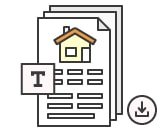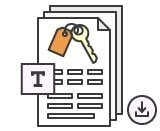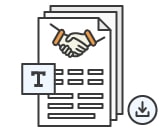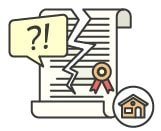Unauthorized Occupant Violation Notice

An Unauthorized Occupant Violation Notice is a formal notice from a landlord to a tenant that states they have violated their lease agreement by having an unauthorized occupant live in their rental unit. The letter should provide any specific information regarding the violation as well as the consequences for failure to correct the violation.
How to Prove there is an Unauthorized Guest
- Personal Observations – The landlord has made personal observations of a guest residing at a tenant’s property. During a landlord inspection or repair, a landlord may notice that there are belongings of another individual that appear permanent. Or the unauthorized guest might even be there when the landlord was at the rental unit. The landlord may also make personal observations of the guest continually entering and leaving the property.
- Tenant or Guest Admission – If a landlord asks a tenant directly they may admit it without knowing it’s a violation of the lease agreement. The guest may also represent themselves as a tenant to the landlord or a maintenance worker coming to repair the rental property.
- Information from Other Tenants – Other tenants may have informed the landlord of a guest that has been staying at a tenant’s rental property regularly.
- Security Footage – Most rental properties have security cameras to keep the tenants and property safe. Security footage may show a pattern of behavior that indicates the guest is living at the property. For instance, if the footage consistently shows the guest arriving in the evening and leaving the next morning, this would be strong evidence that this individual is more than a casual guest.
- Mail – While there may be other legitimate reasons, a guest receiving consistent mail at the property is strong evidence that they are living at the rental property in violation of the lease agreement.
- Increased Utilities – If the landlord is responsible for paying certain utility bills they may observe a consistent and noticeable increase in prices over multiple months. While the increase could be for other reasons, it may also be additional proof that an unauthorized guest is living at the property.
- Proof of Residence – A more direct way of proving there is an unauthorized guest is by asking the guest to provide proof of residence. If they are unable to produce a lease agreement or bill showing they live somewhere else, this is additional evidence that they are living at the rental property in violation of the tenant’s lease agreement.
The line between a guest and an unauthorized occupant is often blurred. While most lease agreements allow for visitors, there should be specific limits on how long a tenant can have guests stay at their rental property. If the lease agreement is vague, a landlord may have a harder time proving that a guest has now become an unauthorized occupant.
How to Handle an Unauthorized Guest
Dealing with an unauthorized guest can be a tricky situation. They have no legal right to live at the property, yet they are not bound by a lease agreement. When a landlord can prove that there is an unauthorized guest, here are some actions they can take to address the situation:
- Talk to the Tenant – Depending on the situation, the first step might be to have a conversation with the tenant. It might be that they overlooked this restriction in the lease agreement and will comply by making sure the guest stops living at the premises. If the situation is not urgent, a conversation between a landlord and tenant may resolve the problem while helping to maintain a good relationship.
- Add Guest to the Lease Agreement – In certain circumstances, the best option may be to screen the guest and have them sign a lease agreement. If adding them does not violate any health or safety codes this is a way to ensure a landlord can enforce the lease agreement with the guest. They can even use this as a reason to increase the monthly rent for the rental property.
- Send a Formal Notice – After talking to the tenant, or if the matter is urgent, the landlord should immediately send a formal notice that the tenant’s unauthorized occupant violates their lease agreement. A landlord can also include a copy of the lease agreement with any relevant portions highlighted to support the reason for sending the notice.
- Eviction – If the situation continues, a landlord may have to evict both the unauthorized occupant and the tenant. A landlord needs to understand their state’s laws to know what type of notice is required and who the landlord can legally evict. This is a tricky situation as only one of the parties has a legally binding agreement with the landlord.
- Send the Tenant a Lease Non-Renewal Letter – If it’s towards the end of the lease it may be less work to simply send the tenant a Lease Non-Renewal Letter. This letter informs the tenant that the landlord will not be renewing their lease when it expires. However, if this letter is ignored and either party remains on the property, the landlord will then have to begin the eviction process.
An unauthorized occupant is both a serious and delicate situation. A landlord should be confident that the tenant has an unauthorized occupant in violation of their lease agreement before proceeding with any action that will remove the tenant from their rental unit. If there is a violation though it must be addressed quickly. Having an unauthorized guest could result in the following issues:
- Potential Damages – Dealing with damages from an unauthorized occupant can be complicated. An unauthorized guest is likely to be less concerned with causing damages or being held liable since they did not sign a lease agreement. While a landlord can still seek damages from the tenant, these damages are better avoided by ensuring that any unauthorized guests are quickly removed.
- Higher Expenses – With more people living in a rental unit, there will be higher expenses. This includes any utilities the landlord pays as well as additional wear and tear.
- Occupancy Violations – There are various state and local laws that impose occupancy limits based on the size of the rental unit and the number of bedrooms. Unauthorized guests can lead to violations of these laws. This can result in unsafe conditions for the tenant(s) as well as fines and other consequences for the landlord.
- Lease Violations – An unauthorized occupant might ignore the terms of the lease agreement since they are not a party to the agreement. Whether it is the violation of parking provisions or “quiet hours” it can negatively impact other tenants and neighbors. These violations will be hard to enforce since this person did not sign a lease agreement.
- Squatters – Even if the tenant moves out of the property, there is a chance that the unauthorized occupant remains there. Evicting an unauthorized occupant can be a complicated and costly process for a landlord.
- Legal Consequences – Having an unauthorized guest can lead to numerous legal consequences. For instance, is the landlord liable if the guest gets injured while living at the property? Depending on the landlord’s state, they could be liable for any injuries to the unauthorized guest if they were expressly invited by the tenant.
- Impact on Unauthorized Guest – Living at a rental property can have some risks for the guest as well. For instance, renter’s insurance only covers people listed in the policy. If the guest has personal property damaged, there will be nothing to compensate them for the loss.
How to Write an Unauthorized Occupant Violation Notice
When preparing this letter, it is important to know what specific information to include. This letter should include the following:
- Date
- Tenant’s name
- Tenant’s address
- Professional greeting to the tenant
- Purpose of the letter: notice of unauthorized occupant violation
- Rental unit address
- Any specific information from the lease that applies to this violation
- The requirement to have the unauthorized occupant vacate the property immediately
- Consequences for failing to correct the violation
- Professional closing with an offer to contact the landlord with any questions or concerns
- Landlord contact information
- Landlord’s signature
- Landlord’s name
Make sure the letter is professional and to the point. While there may be several issues occurring simultaneously, this letter is to put the tenant on notice of this specific violation and have them correct it by removing the unauthorized occupant. Any other issues, such as damages or complaints, can be dealt with separately.
How to Send an Unauthorized Occupant Violation Notice
The landlord should send the notice in a way that requires signature confirmation to document its receipt. This can be accomplished by certified mail. Even better if the landlord sends it by restricted certified mail which requires the addressee to be the only person that can sign for the notice.
The landlord should keep a copy of this notice filed with a notation of the letter’s delivery method and any other relevant information.
What if an Unauthorized Guest Stays?
There are legal requirements for evicting either a tenant or unauthorized occupant. While this notice informs the tenant of the violation, it does not satisfy a state’s requirements for formal notice of eviction.
A formal notice to vacate or correct the lease violation must be sent to the tenant with a final opportunity to remove the unauthorized guest. The time a landlord must provide a tenant to cure this violation depends on the state the property is located. Here is a chart with every state’s required time for a tenant to cure a violation of the lease agreement before being evicted:
| State | Time to Cure before Landlord Can File for Eviction |
| Alabama | 7 business days |
| Alaska | 10 days for violations materially affecting health and safety; 3 days for failing to pay utility bills, resulting in shut-off |
| Arizona | 5 days for violations materially affecting health and safety; 10 days for all other violations |
| Arkansas | 14 days to cure a remediable violation. If a violation materially affects a tenant’s health and safety, the tenant must remedy it as promptly as conditions require in case of emergency |
| California | 3 days, excluding Saturdays, Sundays, and other judicial holidays |
| Colorado | 10 days to cure a minor lease violation; no opportunity to cure substantial lease violations |
| Connecticut | 15 days; except no right to cure for nonpayment of rent or serious nuisance |
| Delaware | 7 days |
| Florida | 7 days (no cure for certain substantial violations) |
| Georgia | None specified |
| Hawaii | 10 days: if it continues, the landlord must wait another 30 days to file for eviction; 24 hours to cease a nuisance: if it has not stopped in 24 hours, 5 days to cure before filing for eviction. |
| Idaho | 3 days |
| Illinois | 10 days |
| Indiana | None specified |
| Iowa | 7 days |
| Kansas | 14 days |
| Kentucky | 15 days |
| Louisiana | 5 days |
| Maine | 7 days |
| Maryland | 30 days unless clear and imminent danger |
| Massachusetts | None specified |
| Michigan | 7 days after receiving notice to restore, repair, or quit |
| Minnesota | No notice required |
| Mississippi | 14 days |
| Missouri | None specified |
| Montana | 14 days; 3 days if unauthorized pet or person on-premises, or if the noncompliance is from verbal abuse of the landlord by a tenant |
| Nebraska | 14 days to cure. If a similar violation recurs within 6 months, the landlord can terminate without an opportunity to cure |
| Nevada | 5 days |
| New Hampshire | 30 days |
| New Jersey | 3 days; lease must specify which violations will result in eviction |
| New Mexico | 7 days |
| New York | Regulated units: 10 days or as set by applicable rent regulation. Non-regulated units: No statute |
| North Carolina | None specified |
| North Dakota | None specified |
| Ohio | 3 days |
| Oklahoma | 10 days |
| Oregon | 14 days |
| Pennsylvania | None specified |
| Rhode Island | 20 days for material noncompliance |
| South Carolina | 14 days |
| South Dakota | 3-day notice to quit (no opportunity to cure) in certain situations. Other situations require no notice |
| Tennessee | 14 days |
| Texas | 3 days |
| Utah | 3 days |
| Vermont | 30 days |
| Virginia | 21 days |
| Washington | 10 days |
| Washington D.C. | 30 days |
| West Virginia | No notice required |
| Wisconsin | 5 days (no opportunity to cure for public housing tenants who have committed drug-related violations) |
| Wyoming | 3 days |
If a landlord plans to proceed with an eviction, it is recommended that they contact an experienced real estate attorney. For any eviction, it can be a costly and time-consuming process. In addition, the burden of proof will be on the landlord to provide evidence that the tenant had an unauthorized guest living at the rental property.
Additional Property Management Templates


Property Management Agreement

Simple 1-Page Lease Agreement

Proof of Residency Letter

Rental Application Approval Letter

Property Management Termination Letter
We make the lives of landlords, tenants and real estate investors easier by giving them the knowledge and resources they care most about. It’s about time the internet had a single place with all of the most up-to-date information from leading experts in property management, investing and real estate law.



![]()
![]()
![]()
![]()
![]()
![]()